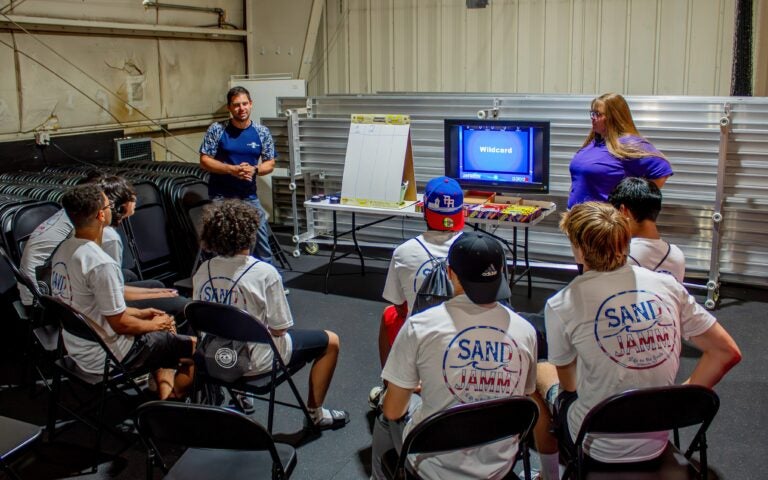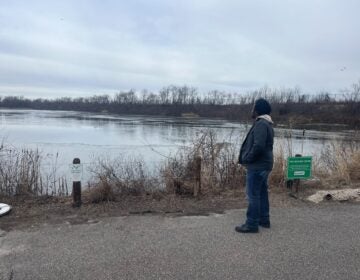Cape May County program trains teens to become mental health first responders
Students enrolled in the program are learning the five-step process to notice, ask, listen, connect to a trusted adult and reinforce friendship to help peers in distress.

Instructors at Cape Assist interact with students on various programs in partnership with schools. (Tusa Magalogo-Fitisemanu for Cape May Assist)
From Camden and Cherry Hill to Trenton and the Jersey Shore, what about life in New Jersey do you want WHYY News to cover? Let us know.
In classrooms across Cape May County, high school students are receiving training to recognize the signs of mental health struggles among their peers, and to respond with care, connection and action.
The teen Mental Health First Aid, or tMFHA, program, led by Cape Assist, a nonprofit based in Wildwood, New Jersey, comes at a time when the nation faces a youth mental health crisis. Funded by the Horizon Foundation for New Jersey and the Substance Abuse and Mental Health Services Administration, the program equips students to support friends who may be struggling. Students are learning the five-step process to notice, ask, listen, connect to a trusted adult and reinforce friendship.
“Cape May County, across the state and the nation are all experiencing a real deficit in mental health counseling,” said Katie Faldetta, executive director of Cape Assist. “We’ve seen consistent funding cuts in school systems, and one of the first things that got cut was these supports that we know kids need. We looked at team mental health first aid as a way to bolster some of this in a space where there wasn’t enough professional support readily available.”

A growing crisis
In New Jersey, hospitalizations for anxiety among adolescents rose by more than 50% between 2019 and 2021, while emergency visits for self-harm climbed 68%, according to Rutgers University. In Cape May County, a 2021 Pride survey revealed 22% of 11th graders had seriously considered harming themselves or others. Cape May Assist works with the county school systems to administer the national Pride survey to inform both the schools and the nonprofits’ work.
Nationally, the Centers for Disease Control and Prevention reported that 20% of children aged 12 to 17 in the U.S. reported symptoms of anxiety, while 18% reported symptoms of depression. By 2023, 40% of high school students said they felt persistent sadness or hopelessness, and 20% had seriously considered attempting suicide.
“It’s just a really tough time to be a kid,” said Joe Faldetta, Cape Assist’s director of prevention services. “They’re worried about school shootings. They’re worried about their online life and how that’s received. And so many of our youth are reporting that they’re struggling with mental health. You always hear, ‘We’re in the midst of a mental health crisis.’ Okay, now that we know we’re in the midst of a mental health crisis, what are we going to do about it?”
Partnering with local high schools
The answer came about four years ago when Cape Assist learned about tMHFA. Created by the National Council for Mental Wellbeing in partnership with Lady Gaga’s Born This Way Foundation, the program adapts existing adult models of mental health first aid into a peer-to-peer format for teenagers. Katie Faldetta was eager to bring the program to Cape May County.
“Our vision was, if we could train youth, who know better than anyone else what their peers are dealing with, to be able to recognize when one of their friends or classmates was struggling, and to connect them with that trusted adult, it could really make an impact in our community,” Joe Faldetta said.
The free program is embedded in the sophomore core curriculum of Cape May County high schools. Lower Cape May Regional High School and Cape May County Technical High School were the first to adopt the training. Since then, Wildwood High School, Middle Township High School and Wildwood Catholic have joined, broadening the program’s reach. Ocean City High School declined to participate. The long-term goal is ambitious: to train 75% of the county’s high school students.
“Our hope was that this training would become such a normal part of the sophomore year curriculum, just like driver’s ed,” Joe Faldetta said.
Lower Cape May Regional has participated in the program since 2022 and plans to provide the training again this year.
“We’ve seen the program’s benefits firsthand, as it provides adults with the knowledge and tools to support young people facing mental health challenges,” said Joell Worster, director of special education, pupil personnel and support services at Lower Cape May Regional High School. “We realized we could empower our students to help their friends or peers by guiding them toward a trusted adult for help. By providing these tools to both adults and teens, we’re better preparing our community to assist those in need.”
To ensure support doesn’t stop at the peer level, the program requires at least 10% of school staff to be trained as well so students have someone to go to, creating a network of trusted adults within each school building. If the issue rises to a mental crisis, professional guide counselors get involved.
A few other nonprofits in northern New Jersey offer teen Mental Health First Aid training, including the Mental Health Association in New Jersey and the New Jersey Prevention Network.
Equipping teens with tools that matter
The program is not about turning teens into counselors. Instead, it trains students to recognize and respond when a friend may be struggling, using a structured five-step process: Notice when a friend isn’t acting like themselves; ask directly if something seems wrong, such as missing football practice; listen closely and be present; connect the peer with a trusted adult like a parent, counselor or teacher; and reinforce friendship by keeping up normal social activities, since isolation can deepen struggles.
For many students, the lessons resonated.
Samantha Benigno, 18, of Cape May, took the course in her junior year at Lower Cape May Regional.
“I learned what exactly a trusted adult was,” she said. “The term has always been thrown loosely around, and I was never exactly sure what that meant. It helped me understand and find a trusted adult.”
She said that the program taught her not to worry about consequences and put her mental health first.
Real impact in schools
Lower Cape May Regional and Cape May Tech, the first two schools to adopt the program, now have more than 75% of their students trained. Word spread quickly among the students themselves.
“One of the harder things with working with any school system is how do you find the time in a schedule to make it work?” Katie Faldetta said. “But we’ve heard nothing but glowing things from the schools that we’re in. At Wildwood Catholic, a junior who hadn’t had the training asked, ‘Why aren’t we all getting this? This is needed.’ And so the school said, ‘Can you do our entire building?’ And we did.”
Data collected after training completion show significant gains in student preparedness: a 31% increase in confidence recognizing signs of a mental health challenge, a 24% increase in knowledge of where to send a friend for help and a nearly 50% increase in ability to help in a substance use crisis.
Cape Assist’s leaders say the program is about shifting culture.
“We try to normalize that it’s very common for somebody to experience a mental health challenge,” Joe Faldetta said. “The sooner that you connect with someone, the sooner you’re going to start to feel better.”
Benigno agrees.
“I’ve had some serious mental health issues. I feel like it’s okay to not be okay,” she said.
WHYY News is partnering with independent journalists across New Jersey to spotlight the people, communities, cultures and distinctive places that shape the Garden State. This work is made possible with support from the Geraldine R. Dodge Foundation.

Get daily updates from WHYY News!
WHYY is your source for fact-based, in-depth journalism and information. As a nonprofit organization, we rely on financial support from readers like you. Please give today.








